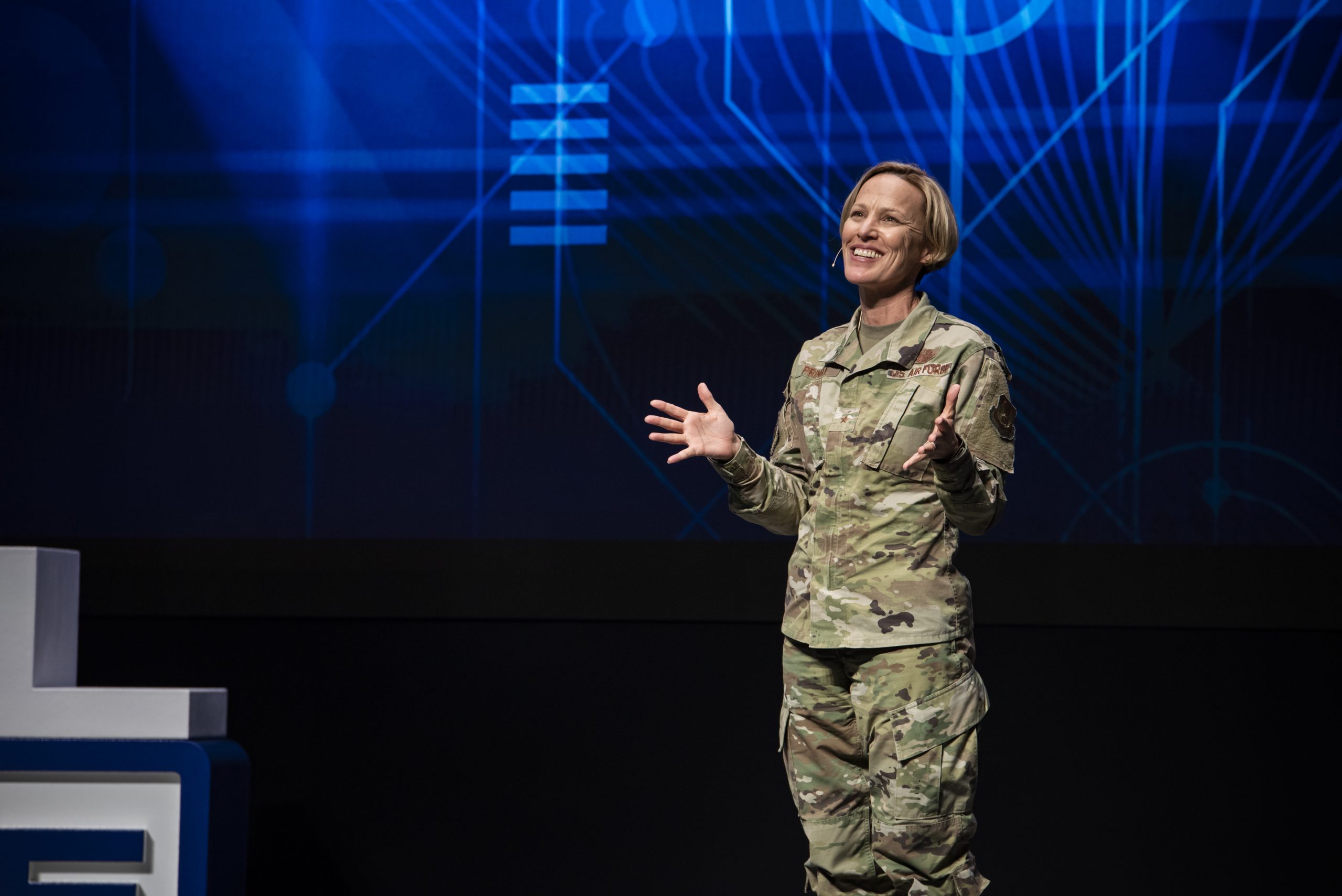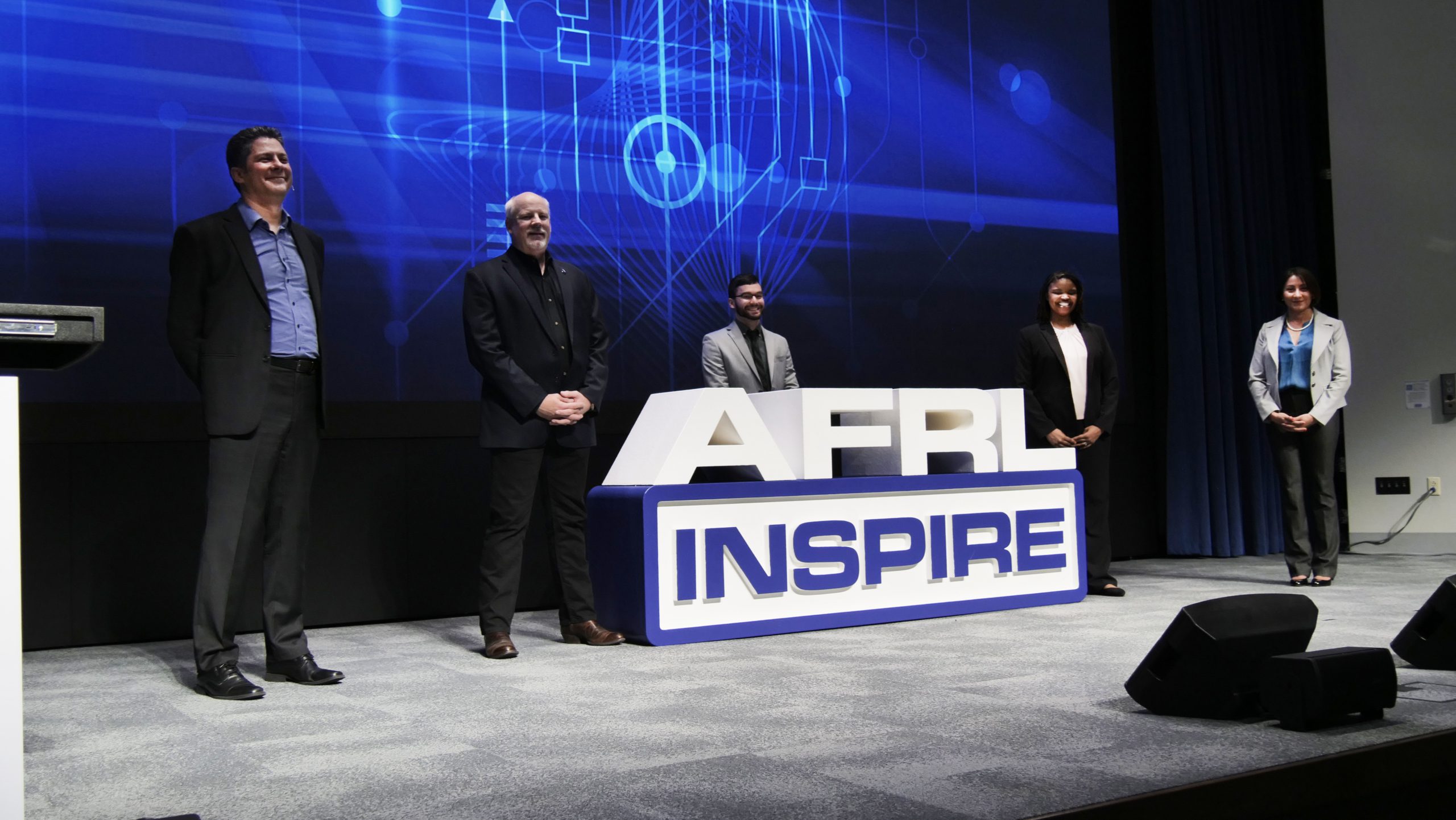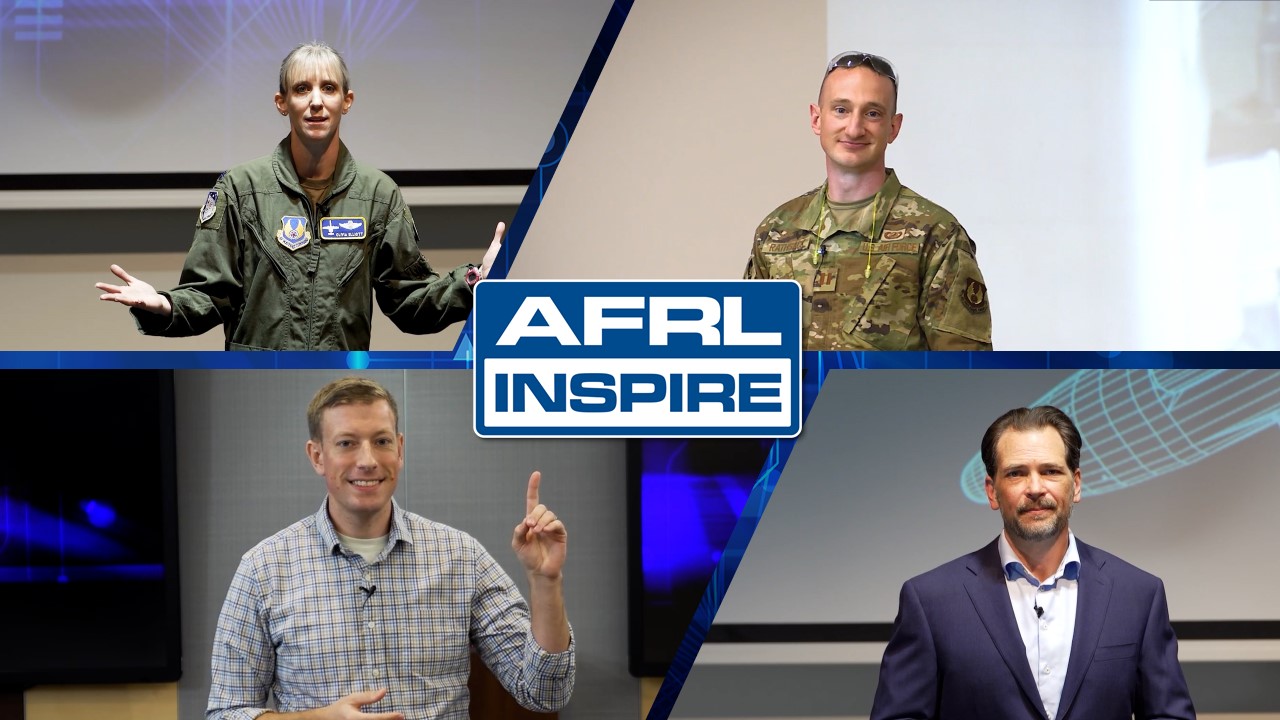S&T professionals from across AFRL share stories, energize workforce during livestreamed event
WRIGHT-PATTERSON AIR FORCE BASE, Ohio (AFRL) – Seven people from across the Air Force Research Laboratory and a guest speaker from the United States Space Force shared unique stories during AFRL Inspire, a two-hour special event livestreamed from the Air Force Institute of Technology’s Kenney Hall Auditorium April 28. The fifth iteration of this TEDx-style event, which celebrates the people who develop science and technology for our Airmen and Guardians, featured eight presentations including four in-person talks and four pre-recorded in California and Florida.
AFRL Commander Brig. Gen. Heather Pringle called this year’s speakers “the stars of the show” during her opening remarks, emphasizing that these “truly remarkable” individuals “represent all of our AFRL workforce,” the scientists, engineers, and functional professionals who make our mission possible.” Pringle noted that this engaging event “provides a snapshot of the achievements of this amazing AFRL workforce.” She welcomed special guests from the U.S. Air Force and the U.S. Space Force, highlighting the significance of one AFRL supporting two services.
Dr. Victoria Coleman, chief scientist of the U.S. Air Force, spoke to the audience from her home in Silicon Valley. She described the “opportunity to hear [about] some of the terrific work that’s done at the lab” as a “real treat” and referred to AFRL as “the cornerstone of the Air Force and Space Force technology advantage.”
Her counterpart, and guest speaker for Inspire, Dr. Joel Mozer, the chief scientist of the U.S. Space Force, delivered the first presentation, titled, “Superhuman Technology,” in which he discussed how multiple technologies unite to create superhuman capabilities through a “combination of human ingenuity, machine efficiency, power and speed.” Mozer noted that in the coming decade, the U.S. will “achieve new levels of such human-machine teaming and develop unimaginable capabilities.”
Lt. Col. Olivia “Pi” Elliott, the test lead for AFRL’s Munitions Directorate, Eglin AFB, presented her talk titled, “The GOAT Method” in which she detailed a challenging incident from her time as an A-10 pilot when she destroyed a herd of goats while protecting ground troops.
“When you manage to fail spectacularly, how do you recover?”
Elliott detailed how she held her head high, learned from the experience and returned to duty a changed, but just as determined, fighter pilot.
“You can’t let failure be your final chapter,” she said. “The mission is still yours, and the future warfighter is counting on us to keep going.”
Taking viewers from the A-10 cockpit to inside the wing of a military aircraft, Dr. James Christensen, a product line lead for Airman sensing and assessment from AFRL’s 711th Human Performance Wing presented his talk, titled “Inside the Wing, Outside the Box.” He spoke of his determination to transfer monitoring systems, similar to the ones hospital wards use to track patients’ vital signs, to aircraft maintenance facilities.
“It didn’t require inventing new technology; all we had to do was reinvent how we used a few pieces of ordinary, [existing] technology,” and account for the “huge differences” in the environment,” he said.
In the end, Christensen and his team demonstrated a system that saves labor hours, improves safety and increases efficiency for Airmen in the maintenance community who perform critical repairs in confined spaces.
“All with an idea borrowed from the hospital and a team of very dedicated people who saw things not as they are, but as they could be.”
For more content, check out our AFRL Lab Life Podcast featuring Dr. Christensen here: EPISODE 16: CONFINED SPACES
Moving attention to the desert of southern California, Capt. Tylor Rathsack, a combustion researcher from AFRL’s Aerospace Systems Directorate at Edwards AFB, highlighted the development of the Rotating Detonation Rocket Engine (RDRE), emphasizing its robust design and improved fuel efficiency. After he broke down the chemical reactions, Rathsack detailed the benefits realized through the rocket engine’s “solid scientific advantage and well-engineered design.”
“Replacing current satellite engines with RDREs will increase their lifespan, provide greater stability and reduce costs dramatically,” he said noting that “our everyday lives are going to improve once these new rocket engines start helping with the heavy lifting” by launching satellites into precise orbit.
With her ability to speak four languages, Dr. Nia Peters, a research electrical engineer from AFRL’s 711th Human Performance Wing, presented a talk, titled “Toward Natural Human-Machine Communication,” in which she revealed how her love of language and technology fuels her desire to create a conversational interface that will allow humans and machines to speak with each other seamlessly.
“Just imagine the near-term possibilities,” she said. “Systems that incorporate conversational Artificial Intelligence could help warfighters learn new languages, transcribe debriefings in real time and even respond to voice commands.”
Representing the ultimate expression of digital engineering, acting as a force multiplier, and giving us tremendous flexibility and adaptability to our weapons systems, Dr. James Sumpter, a senior scientist from AFRL’s Munitions Directorate, Eglin AFB, Florida, presented his talk, titled “Accelerate, Change and Win with Digital Twins,” in which he discussed the benefits of creating computer models that exchange data with sensors in physical systems.
Sumpter detailed how ”AFRL is pioneering a modern type of twin, a digital twin of Air Force weapons” that assesses current conditions, analyzes past events and then leverages this information to predict and adapt to the future.
“The more data available through the digital twin gives engineers the power to virtually iterate and prototype through design concepts in a time and cost efficient manner to yield the most optimum solutions in a high-intensity, quick-decision environment,” he said.
Sara Telano, a contract specialist from AFRL’s Space Vehicles Directorate, Kirtland AFB, New Mexico, presented her talk, titled “Rethinking Sustainability: People. Planet. Profit” in which she related her early years in war-torn El Salvador with her contemporary views on sustainability or finding the right “balance between our needs, our resources and our bottom line.”
Telano referenced the lessons she learned from her parents on the importance of education, self-reliance and community involvement to highlight the power of the individual in making meaningful changes within society as a whole.
“After all, systems don’t change systems,” she said. “People change systems.”
John Henry Williams, a materials engineer and assistant to the chief scientist of AFRL’s Munitions Directorate, Eglin AFB, presented the final talk of the event, titled “Organic, Free-Range Innovation,” outlining a unique approach to productivity in the workplace, a method he observed first-hand that ultimately changed his views on the role of leadership.
“Complete freedom empowers people to come up with new processes that save time and money, reshape competitive advantage, and unlock new opportunities,” he said. Williams said that while “leadership can kill so many great ideas, they can enable [even] more. We have the massive responsibility as leaders to set these environments, and help our folks grow.”
Kenneth McNulty from AFRL Public Affairs served as the emcee for the program, introducing the speakers and providing remarks between the talks.
“Inspire is all about the resiliency, the teamwork, the ingenuity across AFRL,” he said. “It’s about coming together for the greater good. This event truly brought us closer together especially after the challenges we faced in the last year.”
Gen. Pringle closed the event by praising the passion, dedication and intensity of the speakers, calling the event, “the highlight of her week.”
To view AFRL Inspire, visit https://www.facebook.com/AFResearchLab/videos/1613755092158495

AFRL Commander Brig. Gen. Heather Pringle called this year’s speakers “the stars of the show” during her opening remarks, emphasizing that these “truly remarkable” individuals “represent all of our AFRL workforce,” the scientists, engineers, and functional professionals who make our mission possible.” Pringle noted that this engaging event “provides a snapshot of the achievements of this amazing AFRL workforce.” She welcomed special guests from the U.S. Air Force and the U.S. Space Force, highlighting the significance of one AFRL supporting two services. (U.S. Air Force photo/Rich Eldridge)

Dr. James Christensen, Dr. Joel Mozer, Kenneth McNulty, Dr. Nia Peters and Sara Telano on stage during AFRL Inspire 2021. (U.S. Air Force photo/Keith Lewis)

AFRL Inspire pre-recorded speakers: Lt. Col. Olivia “Pi” Elliott, Capt. Tylor Rathsack, John Henry Williams, and Dr. James Sumpter. (U.S. Air Force photo illustration/Patrick Londergan)
